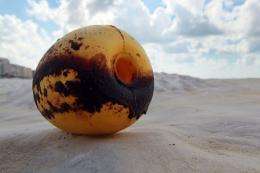Oil safety weak two years after BP spill: studies

Offshore drilling safety and oversight is still lacking two years after the massive BP oil spill sullied the US Gulf Coast, two reports released Tuesday have found.
A presidential commission tasked with investigating the spill said it was "encouraged by the progress being made" by the oil industry and regulators.
But it cautioned that "much more need to be done" to improve drilling safety and environmental protection, particularly in "frontier" areas like the Arctic.
It also chastised Congress for failing to pass legislation needed to ensure regulators have the resources to properly monitor offshore drilling, lift the $75 million liability cap for oil firms, and ensure there are sufficient resources for spill response.
"In just the past 10 months, at least three offshore oil and gas rigs around the world have experienced significant leaks, demonstrating again and again how risky this activity is and emphasizing the need for the types of controls and protections the Commission called for," the report cautioned.
"The risks will only increase as drilling moves into deeper waters with harsher, less familiar environmental conditions."
The environmental group Oceana issued a more scathing report, in which it declared that efforts taken to improve safety and oversight were "woefully inadequate."
"Politics continues to triumph over common sense. It's outrageous that so little progress has been made to make offshore drilling safer," said Jacqueline Savitz, senior campaign director at Oceana.
"It appears that the government has done little more than require actions that were already being done voluntarily, even on the ill-fated rig -- it's as if they are letting the industry regulate itself."
While new rules have been implemented, regulators have not yet addressed important problems such as an insufficient number of inspectors, low fines for breaking the rules, and fundamental deficiencies in the design of blowout preventers, Oceana concluded.
Oil spill response plans also remain inadequate and little has been done to improve cleanup and containment technology, it added.
"Without stronger regulations, and better inspection and enforcement, oil companies will continue to put profits over safety and there will be more problems," Savitz said.
"It's not a matter of whether there will be another oil spill, but when."
The April 20, 2010 explosion on the BP-leased Deepwater Horizon drilling rig killed 11 workers, blackened beaches in five US states and devastated the Gulf Coast's tourism and fishing industries.
It took 87 days to cap BP's runaway well 5,000 feet (1,500 meters) below the surface which spewed some 4.9 million barrels (206 million gallons) of oil into the Gulf of Mexico.
(c) 2012 AFP





















